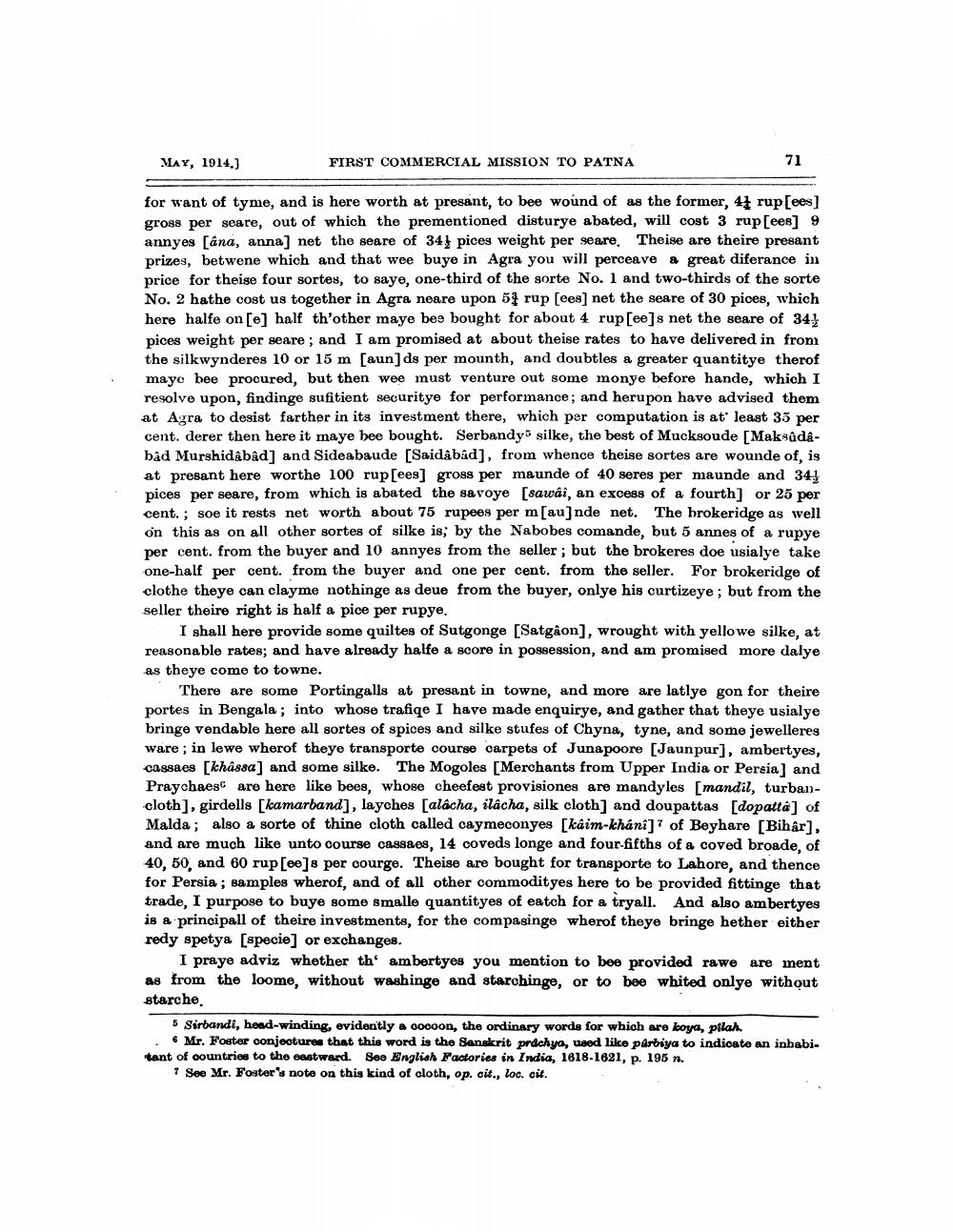________________
MAY, 1914.)
FIRST COMMERCIAL MISSION TO PATNA
for want of tyme, and is here worth at present, to bee wound of as the former, 47 rup[ees] gross per seare, out of which the prementioned disturye abated, will cost 3 rup[ees] 9 annyes [ana, anna] net the seare of 34 pices weight per seare. Theise are theire presant prizes, betwene which and that wee buye in Agra you will perceave a great diferance in price for theise four sortes, to saye, one-third of the sorte No. 1 and two-thirds of the sorte No. 2 hathe cost us together in Agra neare upon 54 rup (ees) net the seare of 30 pices, which here halfe on[e] half th'other maye bee bought for about 4 rup[ee]s net the seare of 341 pices weight per seare; and I am promised at about theise rates to have delivered in from the silkwynderes 10 or 15 m [aun]ds per mounth, and doubtles a greater quantitye therof maye bee procured, but then wee must venture out some monye before hande, which I resolve upon, findinge sufitient securitye for performance; and herupon have advised them at Agra to desist farther in its investment there, which per computation is at least 35 per cent. derer then here it maye bee bought. Serbandy silke, the best of Mucksoude [Maksûdabad Murshidabad] and Sideabaude [Saidabad), from whence theise sortes are wounde of, is at presant here worthe 100 rup[ees] gross per maunde of 40 seres per maunde and 343 pices per seare, from which is abated the savoye (sawái, an excess of a fourth] or 25 per cent.; soe it rests net worth about 75 rupees per m[au]nde net. The brokeridge as well on this as on all other sortes of silke is, by the Nabobes comande, but 5 annes of a rupye per cent. from the buyer and 10 annyes from the seller ; but the brokeres doe usialye take one-half per cent. from the buyer and one per cent. from the seller. For brokeridge of clothe theye can clayme nothinge as deue from the buyer, onlye his curtizeye; but from the seller theire right is half a pice per rupye.
I shall here provide some quiltes of Sutgonge [Satgaon), wrought with yellowe silke, at reasonable rates; and have already halfe a score in possession, and am promised more dalye as theye come to towne.
There are some Portingalls at presant in towne, and more are latlye gon for theire portes in Bengala; into whose trafiqe I have made enquirye, and gather that theye usialye bringe vendable here all sortes of spices and silke stufes of Chyna, tyne, and some jewelleres ware; in lewe whero theye transporte course carpets of Junapoore [Jaunpur], ambertyes, cassaes [lchâssa] and some silke. The Mogoles (Merchants from Upper India or Pereia] and Praychaesc are here like bees, whose cheefest provisiones are mandyles [mandil, turbancloth], girdells [kamarband], layches [alâcha, ilacha, silk cloth] and doupattas [dopatta] of Malda; also a sorte of thine cloth called caymeconyes [kaim-khani]? of Beyhare [Bihar), and are much like unto course cassaes, 14 coveds longe and four-fifths of a coved broade, of 40, 50, and 60 rup[ee] 8 per courge. Theise are bought for transporte to Lahore, and thence for Persia ; samples wherof, and of all other commodityes here to be provided fittinge that trade, I purpose to buye some smalle quantityes of eatch for a tryall. And also am bertyes is a principall of theire investments, for the compasinge wherof theye bringe hether either redy spetya [specie) or exchanges.
I praye adviz whether th' ambertyes you mention to bee provided rawe are ment as from the loome, without washinge and starchinge, or to bee whited onlye without starche.
5 Sirbandi, head-winding, evidently a cocoon, the ordinary words for which are koya, pilah.
Mr. Foster conjectures that this word is the Sanskrit prdchya, waed like parbiya to indicato an inbabi. tant of countries to the eastward. See English Factories in India, 1618-1621, p. 195 n.
7 See Mr. Foster's note on this kind of cloth, op. cit., loc. cit.




